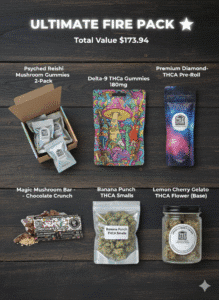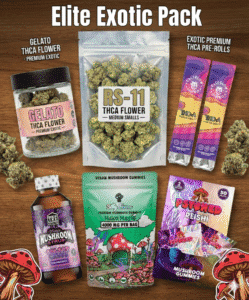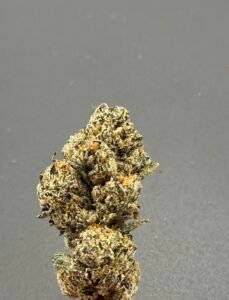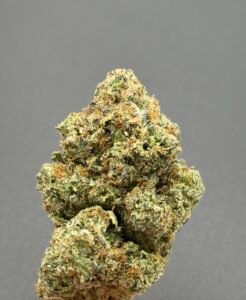CBD vs THC For Anxiety | THC Gummies | Which is Right for You?
In the world of cannabinoids, one of the most frequently asked questions is CBD vs THC. People want clarity: when to use CBD, when THC might help more, and which fits their lifestyle. Did you know? Around 60% of U.S. adults have tried CBD, showing how mainstream it has become in the wellness market. More than a third of CBD users, 39.1% report replacing at least one prescription medication with CBD.
In this blog, we’ll dig into the difference between CBD and THC, explore CBD benefits, compare CBD vs THC for pain relief, examine CBD vs THC for anxiety relief, and even discuss CBD vs THC gummies. By the end, you’ll have a clearer sense of which might be right for you.
What is the Difference Between CBD Vs. THC?
Cannabis plants contain hundreds of compounds, but two stand out: CBD (cannabidiol) and THC (tetrahydrocannabinol). Though they share the same molecular formula, their structures differ slightly, leading to very different effects in your body.
-
- CBD is generally non-psychoactive, it doesn’t give you a “high.”
-
- THC is psychoactive and responsible for the intoxicating feeling associated with cannabis use.
This structural nuance is at the heart of the difference between CBD and THC, a slight shift in molecular shape leads to dramatically different interactions with our endocannabinoid system.
What are the Benefits of CBD?
One of the primary reasons CBD is gaining popularity is its broad spectrum of perceived health effects. While research is still emerging, many users report benefits like:
-
- Relief from inflammation
-
- Support for joint health and recovery
-
- Improved sleep quality
-
- Lessening anxiety or stress
-
- Aid in neuropathic or nerve-related pain
That said, these are preliminary findings, more clinical trials are needed to confirm these effects and determine ideal dosing, purity, and long-term safety.
What Are The Key Differences: CBD vs THC
Here is a side-by-side comparison to highlight the main distinctions between CBD vs. THC.
| Feature | CBD | THC |
| Psychoactive | No | Yes |
| Legal status (hemp-derived) | Legal federally (≤0.3% THC) | Varies by state |
| Common uses | Anxiety, inflammation, sleep, pain support | Pain relief, appetite stimulation, nausea, insomnia |
| Drug-test risk | Possible (if product contains trace THC) | High |
| Side effects | Drowsiness, lightheadedness, GI upset (rare) | Memory impairment, anxiety, paranoia, cognitive effects |
CBD vs THC for Pain Relief
When it comes to pain control, both cannabinoids show promise, but in different ways.
-
- THC often provides faster analgesic effects because it acts directly on CB1 receptors in the brain and spinal cord, modulating pain perception.
-
- CBD, meanwhile, works more subtly by reducing inflammation, modulating immune responses, and interacting with non-cannabinoid receptors (e.g., serotonin).
In some studies, a combination of CBD and THC shows synergistic effects, delivering more relief than THC alone. However, for those wanting to avoid psychoactive effects, CBD alone may be a gentler, safer option for chronic or inflammatory pain.
CBD vs THC for Anxiety Relief
Anxiety is one of the main reasons people try CBD. A 2019 NIH review found CBD to be effective in reducing anxiety and improving sleep in clinical patients. But how do CBD and THC stack up when it comes to calming nerves?
-
- CBD appears to reduce anxiety and stress in many users, possibly by modulating serotonin signaling, reducing overactivation, and dampening stress circuits.
-
- THC, at low doses, may produce relaxation in some people. But higher doses often increase anxiety, paranoia, or racing thoughts.
Thus, when comparing CBD vs THC for anxiety relief, CBD generally wins for safety and consistency. If someone wants occasional THC for mood, the dose must be carefully controlled.
CBD vs THC Gummies
One of the most popular delivery methods today is edible gummies. But CBD vs THC gummies behave differently in your body:
-
- Onset time: Edibles typically take 30–90 minutes to kick in, whether CBD or THC.
-
- Duration: Effects last longer (4–8 hours or more) since the compound is metabolized via the liver.
-
- Effect: A THC gummy gives psychoactive effects; a CBD gummy doesn’t produce a high.
-
- Risks: Because of delayed onset, there’s a danger of overconsumption, especially with THC gummies.
If you’re new, try a low-dose CBD versus THC gummy to see how your body reacts. Always check product lab reports and verify dosing.
How to Choose: Which Is Right for You?
Choosing between CBD vs THC isn’t a one-size-fits-all decision, it depends on your body, goals, tolerance, and even where you live. Both compounds offer unique benefits, but understanding your priorities can help you make an informed and safe choice.
1. Define Your Goal or Use Case
The first step is identifying why you’re using cannabinoids. Each serves a different purpose:
-
- For pain or inflammation relief (without feeling high): Go for CBD.It has strong anti-inflammatory and analgesic properties, making it effective for arthritis, sore muscles, and chronic pain – all without altering your mental state.
-
- For appetite stimulation, nausea reduction, or severe pain management: THC tends to work better. Medical marijuana patients often rely on THC for chemotherapy-related nausea, appetite loss, or nerve pain relief.
-
- For balanced results (mind and body): Consider a CBD:THC hybrid product. Ratios like 1:1 or 2:1 (CBD:THC) can offer therapeutic benefits while minimizing the intensity of THC’s psychoactive effects. These blends are popular in CBD vs THC gummies, tinctures, and oils designed for holistic wellness.
2. Assess Your Tolerance for Psychoactive Effects
THC’s high can be relaxing for some but overwhelming for others. Ask yourself:
Do you prefer to stay clearheaded and functional?
Stick with CBD, it provides calmness and focus without euphoria.
Comfortable with a mild high or using it for recreation?
Try low-dose THC products (2.5–5 mg per serving) or balanced CBD:THC formulas, which soften THC’s intensity while maintaining therapeutic benefits.
Pro Tip: New users often microdose THC to experience its benefits without overdoing it.
3. Understand Legal Status & Workplace Policies
The difference between CBD and THC isn’t just about effects, legality plays a major role.
CBD: Hemp-derived CBD (containing less than 0.3% THC) is federally legal under the 2018 Farm Bill. However, state-specific rules still apply, especially for edibles and topicals.
THC: Regulations vary significantly by state. THC is legal for recreational use in states like California and Colorado but remains restricted in others. Always verify your local laws before purchasing.
If your workplace conducts drug tests, THC can stay in your system for weeks, even trace amounts from full-spectrum CBD could trigger a positive result. Opt for THC-free (broad-spectrum or isolate) products if testing is a concern.
4. Prioritize Product Purity & Lab Testing
Whether you’re buying CBD or THC, quality control matters. The market is saturated with products that mislabel potency or purity.
Look for a Certificate of Analysis (COA) from an independent lab. It confirms cannabinoid levels, absence of heavy metals, and zero contaminants.
Avoid brands without transparent testing, studies show that over 30% of CBD products contain more THC than listed.
Reputable brands like CaliGlow Distro emphasize lab-tested formulations and transparency, a good reminder to always verify before you buy.
5. Consider Personal Sensitivity and Body Chemistry
Everyone reacts differently to cannabinoids. Factors like metabolism, body weight, and genetics affect how your system processes CBD or THC.
-
- If you’re new to either: Start with low doses (e.g., 10–15 mg of CBD or 2.5 mg THC).
-
- Monitor your reaction: Note how long effects take to appear; CBD might take 30–60 minutes, while THC can act faster in inhaled forms.
-
- Adjust gradually: Increase dosage only if needed, and always give your body time to adapt.
-
- Remember the golden rule: “Start low and go slow.
Final Thought
Ultimately, choosing between CBD vs THC comes down to what you value more, calm clarity or stronger symptom relief. CBD offers a safe entry point for wellness seekers, while THC can be transformative for those managing chronic pain or appetite issues. Many find their sweet spot with balanced formulations that combine the best of both worlds.




